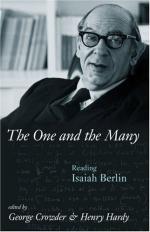|
This section contains 4,582 words (approx. 16 pages at 300 words per page) |

|
SOURCE: “On Pluralism,” in Raritan: A Quarterly Review, Vol. 17, No. 1, Summer, 1997, pp. 83-95.
In the following critique, Furbank argues that Berlin's concept of pluralism is politically invalid.
We have heard a great deal about “pluralism” in the last decade or two, and it would be easy to gain the impression that pluralism was not only an ethical concept but a political one—that, politically speaking, it has something of value to add to democracy and is, indeed, a rival to it. I want to argue that this is a fallacy.
Of course, it is not instantly clear what people mean by pluralism. Isaiah Berlin, who claims Herder to have been in a sense the inventor of pluralism as a doctrine, defines it as
the belief not merely in the multiplicity, but in the incommensurability, of the values of different cultures and societies and, in addition, in the incompatibility...
|
This section contains 4,582 words (approx. 16 pages at 300 words per page) |

|


